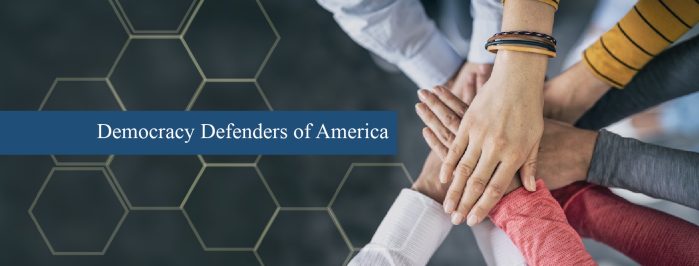Julie Stauch is a longtime Democratic campaign staffer and candidate consultant. Democracy Defenders of America is a nonpartisan, nonprofit organization. -promoted by Laura Belin
The Annenberg Institute timed the publication of their 2020 Civics Knowledge survey to coincide with Constitution Day on September 17. Only 51 percent of respondents could name the three branches of government. It’s appalling news, because knowing that there are three branches of government is like knowing a building has four walls and a roof. It’s all much more than that basic knowledge.
I’ve had more years than I want to admit to working in the governmental, business, and political arenas. No matter where I worked or volunteered, there have always been people who don’t know how our various governments work. Time and again I’ve explained things ranging from how a given state’s city council system operates to why states have different constitutions to “No, ma’am, the Attorney General can’t represent your son in his divorce. The Attorney General represents the state, not individuals.” But it is much worse today.
During a podcast I was listening to last fall, the host went off on a short rant about how little Americans know about civics, I sat up, looked at my phone, and shouted, “Yes!” That’s when what is now known as Democracy Defenders of America came into being.
Once the election was over, I started digging into the research phase to learn what’s out there already, so we didn’t reinvent the wheel. I found plenty of K-12 programs, but nothing designed for adults who are already of voting age. Also, no program was going beyond basic facts to help people learn how to organize in their community and empower others to participate.
I also remembered my own experiences lobbying for causes. Every organization gave great trainings before we’d go to the state capitol. Then we’d be dropped off and each person would go talk to their state representative or state senator–in theory.
What I saw in practice was people congregating in the cafeteria. It was intimidating for many of them to go to the entrance to each chamber and ask for their elected leader.
Later, when I worked at a nonprofit and oversaw government affairs, I changed the way we did our Lobby Day. We had great trainings – just like they had before – but instead of dropping people off to make individual contacts, we put people in teams. One person, who was comfortable with leading the conversation, was the spokesperson and everyone else was encouraged to share their thoughts as they felt ready to do so. It worked!
Supporters had a great experience because their perceived risk was reduced, and they were empowered to support each other. The following year they came back and brought friends, all because we helped each person see how to have the conversations before they had to do it themselves.
The difference at Democracy Defenders of America is the addition of relational organizing. Why? Because that approach connects people through people they already know. It’s what we do as humans…we go to people we know to help solve problems. Friend A brings in their friend Z and soon Z is as much a part of the group as A. It works!
But to learn only about civics without learning about relational organizing and how to build a coalition for any cause, that education isn’t as well utilized. It’s like buying groceries and then eating out all the time. What are you doing with those groceries? We want you to be able to use every bit of what you learn about our democracy to help make your community stronger.
We need a different approach. Democracy Defenders of America is focused on providing the unique combination of civic education with organizing. The goal is to generate common ground understanding of the processes–no matter what we think about specific issues or partisan politics–and move more people to full civic engagement. Process over politics and partisanship. That’s us.
The great thing about this approach is we create common ground and a safe space in which to talk about how our government works and why it works that way. One of the biggest misunderstandings people have right now is thinking disagreements are bad. The truth is, disagreements are a natural and critical part of a functioning democracy. Having the tools and common language to work through those disagreements is how we build community through collective engagement and learn from each other to solve the very real challenges we face in our country.
We need you to be involved with Democracy Defenders of America. Defending our democracy and reclaiming civic knowledge and civic engagement beyond voting is on all of us.
The courses will go live fall of 2021. Between now and then, we could use your help sharing stories of a time that you reached out to an elected official or worked with others in your community to help solve a problem. What worked for you? What didn’t work? We need these case studies of real life experiences to share through the education program.
Start now! Join us, share a story about your experience. Follow us on Facebook and Twitter. And visit ddofamerica.org to learn more and make a tax-deductible donation to invest in the work of defending democracy. Then please sign up for one or both of our courses this fall. The more you know, the better our country, state, county and local governments will respond. Let’s do this together!
Editor’s note: In addition to Julie Stauch, former State Representative Heather Matson and Susan Everett are founding members of Democracy Defenders of America.
Top image first published on the Democracy Defenders of America Facebook page.

